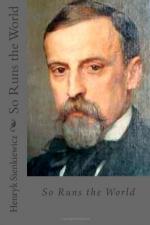Although we have a popular saying: Comparaison n’est pas raison, one cannot refrain from stating here that this love for the poor, the little, and the oppressed, brought out so powerfully in Sienkiewicz’s short stories, constitutes a link between him and Francois Coppee, who is so great a friend of the friendless and the oppressed, those who, without noise, bear the heaviest chains, the pariahs of our happy and smiling society. The only difference between the short stories of these two writers is this, that notwithstanding all the mastercraft of Coppee’s work, one forgets the impressions produced by the reading of his work—while it is almost impossible to forget “The Lighthouse Keeper” looking on any lighthouse, or “Yanko the Musician” listening to a poor wandering boy playing on the street, or “Bartek the Victor” seeing soldiers of which military discipline have made machines rather than thinking beings, or “The Diary of a Tutor” contemplating the pale face of children overloaded with studies. Another difference between those two writers—the comparison is always between their short stories—is this, that while Sienkiewicz’s figures and characters are universal, international—if one can use this adjective here—and can be applied to the students of any country, to the soldiers of any nation, to any wandering musician and to the light-keeper on any sea, the figures of Francois Coppee are mostly Parisian and could be hardly displaced from their Parisian surroundings and conditions.
Sometimes the whole short story is written for the sake of that which the French call pointe. When one has finished the reading of “Zeus’s Sentence,” for a moment the charming description of the evening and Athenian night is lost. And what a beautiful description it is! If the art of reading were cultivated in America as it is in France and Germany, I would not be surprised if some American Legouve or Strakosch were to add to his repertoire such productions of prose as this humorously poetic “Zeus’s Sentence,” or that mystic madrigal, “Be Blessed.”
“But the dusk did not last long,” writes Sienkiewicz. “Soon from the Archipelago appeared the pale Selene and began to sail like a silvery boat in the heavenly space. And the walls of the Acropolis lighted again, but they beamed now with a pale green light, and looked more than ever like the vision of a dream.”
But all these, and other equally charming pictures, disappear for a moment from the memory of the reader. There remains only the final joke—only Zeus’s sentence. “A virtuous woman—especially when she loves another man—can resist Apollo. But surely and always a stupid woman will resist him.”
Only when one thinks of the story does one see that the ending—that “immoral conclusion” I should say if I were not able to understand the joke—does not constitute the essence of the story. Only then we find a delight in the description of the city for which the wagons cater the divine barley, and the water is carried by the girls, “with amphorae poised on their shoulders and lifted hands, going home, light and graceful, like immortal nymphs.”




